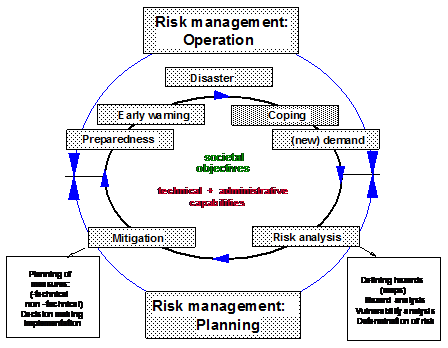A disaster is defined as a state caused by adverse circumstances, where people making up a social group cannot cope without outside help. This definition of disaster conforms to the modern view of disaster as a social event, where the people at risk are vulnerable to the effect of a natural extreme event because of their social and environmental conditions. According to this view, floods are to be seen from the perspective of people oriented flood management.
Consequently, the purpose of flood management is:
a. to protect the people at risk up to a certain acceptable (affordable) level, and
b. to reduce the consequences of an extreme event exceeding the acceptable level, so that a disaster is prevented.
This is the principle of „living with floods“.

Fig. 1: the risk management cycle.
From the flood manager’s point of view,floods are considered from a multi-dimensional perspective, as part of the risk management cycle shown in Fig.1, and range from planning to implementation and to operation. The cycle has two semi-circles: the top one, which covers the aspects of operating an existing system to prevent a disaster from happening, and the bottom semi-circle, which covers the activities associated with the design or improvement of a flood protection system, including risk assessment and project planning. Flood risk management sees floods as:
· an hydrological problem: how big is the flood, what is its recurrence interval, how can floods be forecasted
· a technical problem: how must a hydraulic system look which reduces the floods to a desired level
· an hydraulic problem: how are flood magnitudes converted to water stages, to hydraulic loads, to erosion and water quality parameters
· an ecological problem: how does the flood and the remedial action affect the environment, but also how are people and their health potentially affected by floods
· a political problem: can a compromise between conflicting interests be found, and how do we give flood protection the right priority among the many tasks of the Government
If seen from this generalized point of view it is evident that there is a need to exchange information on floods in all its aspects and manifestations, as they are observed in all parts of the earth, and handled by experienced experts in every country, in order to learn from one another and to avoid mistakes made elsewhere.